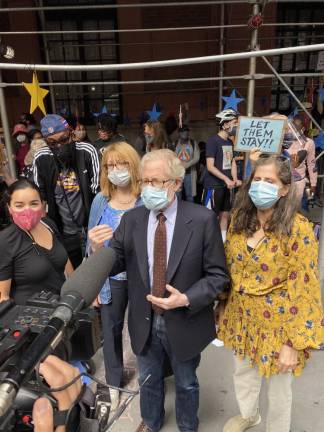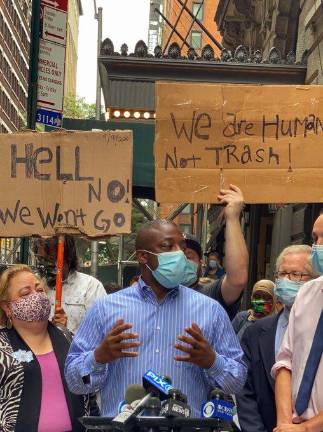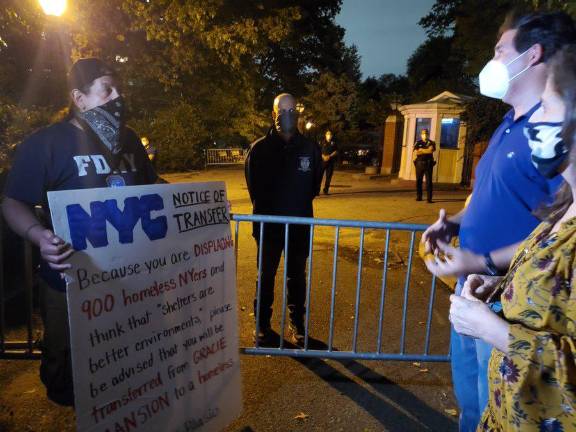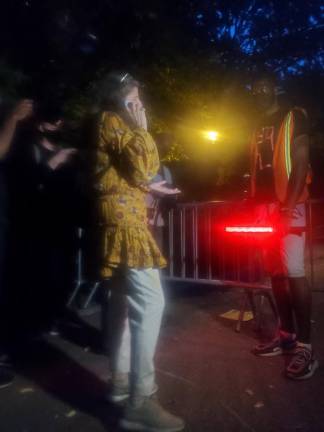Mayor de Blasio said Monday he was temporarily freezing the plan he had agreed to just last week to abandon use of the Lucerne Hotel as a shelter for 283 men without homes while his administration reviews the entire use of hotels as an alternative to congregate shelters during the pandemic.
“We’re going to look at the whole shelter system and the whole question of what we should or should not be doing in hotels at this point,” the mayor said at a news conference. “And then we will figure out quickly what next steps to take.”
The decision also halted the move of couples and families from the Harmonia shelter in the old Hotel Chandler on East 31st Street, who were being transferred to make room for the men from the Lucerne. Some of the Harmonia residents are disabled.
De Blasio said the review would be conducted by his Homeless Services Commissioner, Steven Banks and Corporation Counsel Jim Jordan, who must include in the review consideration of a lawsuit brought by the Legal Aid Society to block the transfers.
The announcement was the latest neck-snapping development in the controversy around the city’s use of 63 hotels as emergency shelters in the pandemic. Several neighborhoods objected to deteriorating conditions they attributed to the presence of men and women who needed support they weren’t getting.
But when the mayor tried to respond to the objections of some Upper West Siders by agreeing to remove the 283 men at the Lucerne, other West Siders rallied to defend use of the hotel as a shelter.
“The homeless are being used like pawns in a shell game of whack-a-mole,” said Ian Alterman, a longtime West Sider and a spokesperson for UWS Open Hearts, a group formed to speak up for those experiencing homelessness.
Igniting a Larger Controversy
The city’s agreement to abandon use of the Lucerne was announced just a week ago on Tuesday, September 8. But instead of ending the controversy it ignited a larger one.
After the city’s initial decision to move the Lucerne residents, Randy Mastro, a lawyer for a group of West Siders who had threatened to sue the city if it did not move the men said, “We are gratified that the community is being heard and concrete action is being taken to rectify this tragic situation.”
Mastro, a former deputy mayor in the administration of Rudolph Giuliani, also disclosed that the city has committed to cease using a second hotel in the neighborhood, The Belleclaire. He did not offer timing for this.
But the next morning, elected officials appeared at a press conference at The Lucerne to oppose the decision, including Public Advocate Jumaane Williams, Council Member Rosenthal, State Senator Brad Hoylman and State Assemblymember Linda Rosenthal.
“I am especially ashamed of our mayor today,” said Williams, a possible contender to be de Blasio’s successor. “It’s disgusting what he’s doing ... He has failed miserably when it comes to housing ... when it comes to homelessness.”
For some of the men in the Lucerne this would have been the fourth move since the start of the pandemic. “These men, many of whom have suffered trauma and been disadvantaged all their lives, deserve better,” the operator of the shelter, Project Renewal, said in a statement. “So do our 50 staff members who have worked around the clock to ensure clients had a smooth and successful transition.”
Over the weekend, protesters flocked to the Lucerne and Harmonia shelters, joined by an array of elected officials from the West and East Sides, including Manhattan Borough President Gale Brewer, State Senators Liz Kreuger and Brian Benjamin, Assembly Members Dick Gottfried and Linda Rosenthal, and City Council Members Keith Powers and Helen Rosenthal.
On Sunday, supporters of residents of the Lucerne and Harmonia gathered outside Gracie Mansion to demand that the Mayor reconsider the transfers. After eight hours outside, Helen Rosenthal, who had demanded that the mayor speak face-to-face with a resident of the Harmonia named Michael, got a phone call saying that de Blasio would send his Commissioner of Community Affairs, Marco Carrion, to meet with residents and staff of both the Lucerne and Harmonia shelters “before any more displacements happen,” according to Corinne Low, co-founder of UWS Open Hearts.
The next morning the Mayor announced the freeze on transfers.
Mastro said in a statement that he expects and understands that the mayor will “honor his commitment” to move the men from the Lucerne into appropriate facilities by the end of September.
“I’m not going to speak to exact days,” de Blasio said Tuesday. But he said his team will “be coming back soon with that vision” of what to do overall.
Unacceptable Conditions
The news has stirred anguished debate on the Upper West Side. Elected officials and residents had expressed great anger that the city had given no notice when it moved homeless into three neighborhood hotels. The third is the Belnord on 87th Street.
While some residents said the homeless should be made welcome, others said they were creating unacceptable conditions on the street and contributing to a spike in crime. A Zoom town hall meeting drew 1100 people to discuss the issue.
After the group represented by Mastro, the West Side Community Organization, threatened to sue, The Legal Aid Society warned the Mayor that they would fight back in court if he caved to “racist Nimbyism.”
The city had argued that its actions, including the lack of notice to the community, were necessary to save lives in the emergency conditions created by the pandemic. In fact, the overall infection rate among the homeless has been contained, according to city data.
But the specific case for the Lucerne was undermined by disclosure that many of the men had not come directly from congregate shelters but from another hotel, on West 51st Street, which the neighborhood had objected to. Straus News reported this a week ago Saturday.
Roderick Jones, Executive Director of the Goddard Riverside Community Center, said Monday that the tragedy was that the crisis could have been averted if the City had communicated better. “If we had worked together we could have resolved a lot of what caused the most friction,” he said.
Jones said Goddard Riverside had been in the midst of developing a recreation plan for the men at the Lucerne that was to be paid for by private contributions from Upper West Siders. “It wasn’t cheap,” he said. “In these times we have to be careful of how everyone gets painted with the same brush. We are all in this together and if we work collectively together we can make sure everybody’s needs get met.”
“We’re going to look at the whole shelter system and the whole question of what we should or should not be doing in hotels at this point.” Mayor Bill de Blasio



